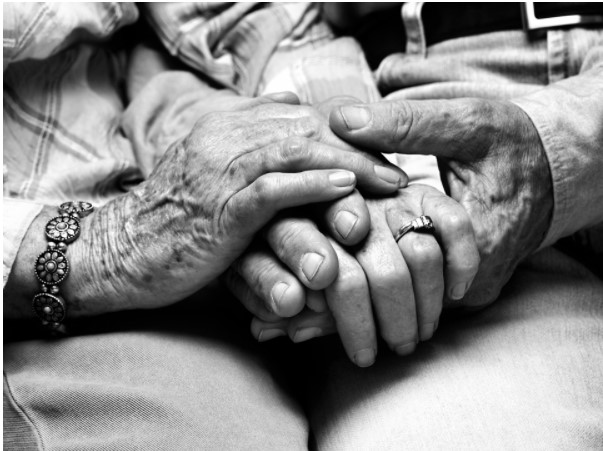In Raymond Carver’s story, “What We Talk About When We Talk About Love,” two couples, in what is shaping up as to be an all-nighter, soak themselves in far too much drink while discussing, painfully, what they believe love really means. The discussion turns deadly serious and cold sober when one of them, a cardiologist, talks about an old couple whose broken bodies (they’d been in an accident) required full-body casts. The old man grew depressed, the doctor says, not because of his injuries or hers, but because that body cast’s eyeholes simply would not allow him the simple joy of seeing the women he’d loved for so many years.
For a while at least, that love story shuts down their grueling conversation, but my guess is that most retirement home care-givers might just yawn through it because they experience similar stories firsthand almost every week, elderly husbands or wives who drive in to convalescent homes and faithfully attend their spouse’s every meal despite the fact that their spouses couldn’t pick their mates out from a police line.
Dedication. Undying love. Incredible selflessness.
One of the amazing ironies of our culture is that we reward those who take care of our most needy so pitifully.
I don’t know why exactly, but lately – when I’m out on the acreage trimming trees or mowing the lawn or doing almost anything – old gospel songs haunt me to the point where I find myself singing through them on some kind of unending loop. Like this one, almost unknown today, but a part of a repertoire I can't forget:
Give of your best to the Master
Give of the strength of your youth;
Clad in salvation’s full armor,
Join in the battle for truth.
The conceit that runs through that old hymn was apropos for kids, like me, children of war vets: the Christian life as a battle. We’re not so keen on the backdrop any more, which may explain why that old hymn has largely disappeared, save in the sealed vault of my memory.
The Sunday school lesson it teaches is a good one – since no one can serve two masters, the scripture says, give of your best to the master, give of “the strength of your youth.”
Dedication. Undying love. Incredible selflessness.
I can’t say it quite as graphically as Mother Teresa did, but she practiced a devoted sacramentalist faith that’s unlike mine, for better or for worse, faith constructed on what she tasted in the blessed sacrament, a rite that infuses the language she offered those who served in her army of care-givers, language like this: “Let the poor and the people eat you up,” she told the Sisters, a vastly more dramatic take on the old hymn’s commanding admonition.
Let the people “bite” your smile, your time. You sometimes might prefer not to even look at somebody when you had some misunderstanding. Then, not only you look, but give a smile. . . . Learn by heart you must let the people eat you up.I don’t think it’s possible, really, to offer a way of life that is more patently un-American. We pass along God’s peace most bountifully when we give ourselves away, when we dedicate our undying love in selflessness that’s so profound as to die to we are, or want or wish to be, in the name of the Lord Jesus.
“Let the poor and the people eat you up,” she said. What she meant was, to them, be the body and the blood. To them, be Jesus.

No comments:
Post a Comment